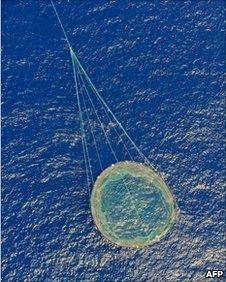MPs and experts in talks to stop fish stocks' collapse
- Published

A tuna fishing boat in the Mediterranean drags a cage of nets
MPs from major fishing nations and fisheries experts are holding talks in London on how to prevent the collapse of global fish stocks.
They say it is the first step towards reaching a global agreement.
One proposal is to create huge no-fishing zones in the oceans so fish can be offered a refuge for breeding.
The extent of the fisheries threat is disputed, but some species, including the Atlantic bluefin tuna, may be near extinction.
Climate change may grab the headlines, but it is a collapse in fisheries that some scientists consider the most imminent global environmental threat.
The environment organisation for parliamentarians, called Globe, has convened what it says is the first worldwide meeting of its type to start the quest for a global agreement on fisheries.
Some 30% of fish stocks are estimated to be badly depleted already.
The members of parliament fear that as fishermen seek to feed a population that is growing and increasingly wealthy, it is almost inevitable that there will be a crisis.
Marine reserves proposed
MPs will develop plans for new laws that can be advanced by their respective parliaments.
The move is being made as 245 marine scientists from 35 countries have joined forces to call for a worldwide system of very large, highly-protected marine reserves.
They say it is "an essential and long-overdue contribution to improving stewardship of the oceans".
So far, they say, just 0.5% of the ocean is fully protected from fishing.